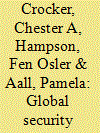| Srl | Item |
| 1 |
ID:
131100


|
|
|
|
|
| Publication |
2014.
|
| Summary/Abstract |
At a time when the United Nations and key powerful states are pulling back from robust engagement in conflict management, regional organizations and ad hoc groupings of diverse organizations - collective conflict management initiatives - are stepping into the vacuum. In order to understand these two approaches - and why and when they may be operating together - this article compares them as they affect three significant questions and challenges in contemporary conflict management: is an intervention legitimate, is it effective, and does it set precedents for the community of states and international organizations that might be inclined to act. It notes that these approaches bring different strengths to an intervention process. Regional organizations play an increasingly critical role in providing legitimacy for an intervention, while the fact that collective conflict management initiatives do not set a precedent for further engagement allows them to act with more flexibility. The article concludes that neither of these approaches is sufficient to create a successor security regime to the post-cold war international system. It suggests that global power diffusion will be constrained by the irreplaceable core security competencies of powerful states acting bilaterally or, when it suits them, through regional bodies or the UN Security Council.
|
|
|
|
|
|
|
|
|
|
|
|
|
|
|
|
| 2 |
ID:
141712


|
|
|
|
|
| Summary/Abstract |
Multiparty mediation, which occurs when two or more third parties cooperate or compete in helping antagonists negotiate a conflict settlement, carries both risks and rewards as a conflict management strategy. Cooperating multiple third parties can increase the chances of crafting an agreement, band together to create greater pressure on the conflict parties to reach agreement, and supply outside resources to help implement the negotiated agreement. Competing multiple third parties can undercut each other, prolonging the conflict and allowing antagonists to resist necessary compromises and negotiated concessions. This article examines the changing environment for multiparty mediation and the impact of five changes that affect the practice of mediation. It derives some interim conclusions about where the field is heading and offers some recommendations for making multiparty engagements more effective.
|
|
|
|
|
|
|
|
|
|
|
|
|
|
|
|